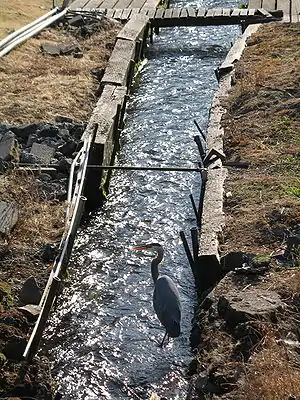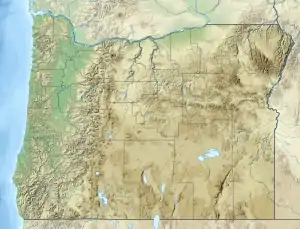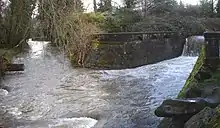Crystal Springs Creek
Crystal Springs Creek, a 2.7-mile (4.3 km)[3] tributary of Johnson Creek, flows entirely within the city of Portland in the U.S. state of Oregon.[4] The stream rises from springs near the Reed College campus in the southeastern part of the city and runs generally southwest to meet Johnson Creek in the Portland neighborhood of Sellwood.[4]
| Crystal Springs Creek | |
|---|---|
 Headwaters near Reed College | |
 Location of the mouth of Crystal Springs Creek in Oregon | |
| Location | |
| Country | United States |
| State | Oregon |
| County | Multnomah |
| Physical characteristics | |
| Source | natural springs near Reed College |
| • location | Portland, Oregon |
| • coordinates | 45°28′50″N 122°37′24″W[1] |
| • elevation | 203 ft (62 m)[2] |
| Mouth | Johnson Creek |
• location | Portland, Oregon |
• coordinates | 45°27′36″N 122°38′32″W[1] |
• elevation | 43 ft (13 m)[1] |
| Length | 2.7 mi (4.3 km)[3] |
The creek's even flow and cool year-round temperature make it a good place for fish, including coho and chinook salmon and steelhead. Steelhead populations are within the Lower Columbia River Steelhead distinct population segment as listed as threatened (2011).[5] Coho salmon populations are within the Lower Columbia River Coho Evolutionary Significant Unit (ESU) and listed as threatened (2011).[5] Chinook salmon populations are within the Lower Columbia River Chinook ESU and listed as threatened (2011).[5] The stream has been designated critical habitat under the Endangered Species Act. To improve the habitat, the city is replacing old culverts that impede fish passage, and Reed College is working to improve habitat and fish passage near the headwaters at Reed Lake.[4]
Course
From Reed Lake and Blue Bridge on the Reed College campus, the stream flows west under Southeast 28th Avenue, then south around Crystal Springs Lake and the Crystal Springs Rhododendron Garden, which are on the left bank. Flowing south through the Eastmoreland Golf Course, the creek receives the overflow from Crystal Springs Lake. Further downstream, Crystal Springs Creek flows southwest under the tracks of the Union Pacific Railroad and Oregon Route 99E (Southeast McLoughlin Boulevard). Turning sharply south again, the stream passes through residential neighborhoods, Westmoreland Park, and Johnson Creek Park, where it meets Johnson Creek. About 1 mile (1.6 km) further downstream, Johnson Creek empties into the Willamette River 18.5 miles (29.8 km) above its confluence with the Columbia River.[6][7]
See also
References
- "Crystal Springs Creek". Geographic Names Information System (GNIS). United States Geological Survey. November 28, 1980. Retrieved November 22, 2010.
- Source elevation derived from Google Earth search using source coordinates.
- "Nature in Neighborhoods grant helps Crystal Springs Creek become sanctuary for salmon". Metro Regional Government. March 23, 2010. Archived from the original on May 27, 2010. Retrieved November 24, 2010.
- "Crystal Springs Creek Habitat Restoration Projects" (PDF). Portland Bureau of Environmental Services. 2009. Retrieved November 28, 2010.
- "5-Year Review: Summary & Evaluation of Lower Columbia River Chinook, Columbia River Chum, Lower Columbia River Coho, Lower Columbia River Steelhead" (PDF). National Oceanic and Atmospheric Administration. 2011. Retrieved 2013-12-03.
- "Crystal Springs Creek". Google Maps. Retrieved November 30, 2010.
- United States Geological Survey. "United States Geological Survey Topographic Map: Lake Oswego, Oregon, quadrangle". TopoQuest. Retrieved November 29, 2010. The map includes river mile (RM) markers along the Willamette.
